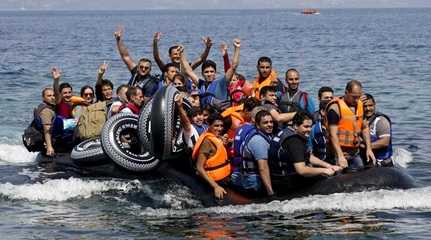
by Amelia Smith
Call logs released by France have revealed that French and British authorities ignored calls for help several times when a boat carrying asylum seekers ran into difficulty whilst crossing the English Channel late last year.
In the early hours of 24 November 2021, at least 27 people drowned as France and the UK passed responsibility between themselves for rescuing the dinghy.
The call logs were revealed on The Crossing, an ITV documentary about the worst disaster in 30 years in the English Channel.
The British government has so far refused to release any information about what happened that night, according to the documentary.
At 1.48 am water started to enter the dinghy, the engine stopped, and it began to deflate. Three minutes later passengers on board first called the French coastguard. They were told help was on its way.
"Some were calling French police continuously; others called the UK nonstop. French police told them they were in UK water, so they were not permitted to help," one of the family members of the victim said.
"UK police said to wait, and they'll come to that location." Passengers on board believed that someone was going to get them, but no one came.
READ: Sunak says his 'most pressing priority' is to stop small boats crossing the Channel
At 2.33 am, following several calls by passengers to French and English authorities, France told the people on board that they were in British waters and that they should phone 999.
One of two survivors, Somali refugee Issa Mohammed, told ITV that they could not see where the water was coming in as the boat was so crowded.
"We asked people to empty their drinking water and use bottles to help dry the boat," he said.
"People were calling the emergency number from eight different phones. We told them we had children and families on board, and we need help to save our lives."
The French and British authorities continued to argue between them about whose responsibility the boat was, according to the documents leaked on the programme, with the British at one point saying that the dial tone from one of the distress calls indicated the boat was in French waters.
In another call 12 minutes after they are first told to call British emergency services, passengers are again told to call 999 and despite the sound of screams in the background, they are told once again to call 999.
At 3 am the boat overturned and some of the passengers began to drown. "Yes, but you are in English waters sir," the French authorities say as one of the passengers tells him the people on board are in the water.
At 4.16 am a passenger call back and says, "people are in the water and it's over" and asks for a helicopter because people are dying.
Just after 4.30 am, the French coastguard closed its incident call log on the assumption that the UK was dealing with the rescue, but they were not.
The passengers on board who had not drowned died of exposure, one by one.
Twelve hours after that first call to the French coastguard, a French fisherman reported seeing dead bodies floating in the Channel and an unusable, deflated small boat nearby and French authorities finally broadcast a mayday call.
Among the 27 people that died was a 24-year-old Kurdish student from northern Iraq, Maryam Nuri Mohamed Amin, who was trying to join her fiancée in the UK.
At least four bodies are still missing, including that of 18-year-old Twana Mohammed who was also from the Kurdistan region of northern Iraq. The known victims are from Iraq, Egypt, Iran, Afghanistan, Ethiopia and Somalia.
Maritime expert Matthew Schanck, hired by lawyers of the victims, told The Crossing that for most of the time the boat was in UK waters.
"The fact of the matter is, over 30 people were left in the middle of the busiest shipping lane in the world, slowly perishing one by one, and almost nothing happened," said Schanck.
This year, over 40,000 people have crossed the English Channel in small boats, many from Afghanistan, Iraq, and Iran.
Each year since 2018, the number of people crossing the Channel in small boats has almost doubled.
This content was published in Middle East Monitor on November 16, 2022. To restrict the overall size; some images may have been excluded.
Opinions expressed in this article are the author's own and do not necessarily reflect the views of UMMnews.




